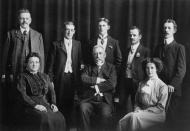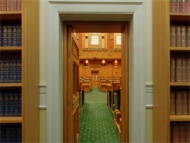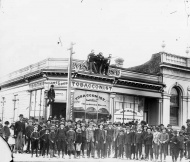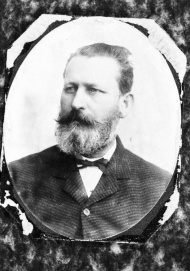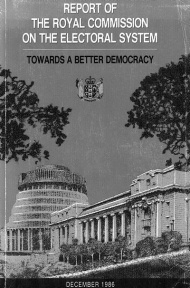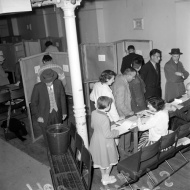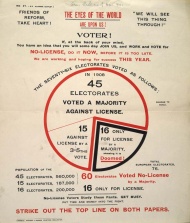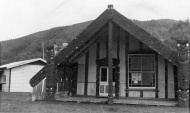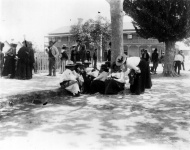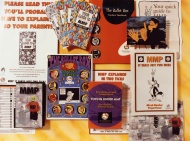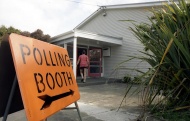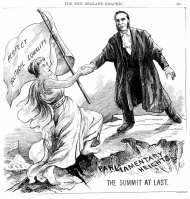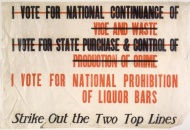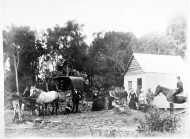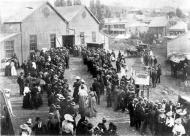Events In History
-
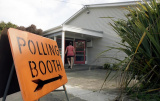 12 October 1996New Zealanders go to the polls in first MMP election
12 October 1996New Zealanders go to the polls in first MMP electionIn the first general election held under the new mixed-member proportional representation (MMP) voting system, New Zealand voters selected 120 members of Parliament through a mixture of electorate contests and party lists. Read more...
-
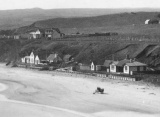 6 December 1922Chatham Islanders vote in first election
6 December 1922Chatham Islanders vote in first electionAlthough the first elections for New Zealand’s House of Representatives were held in 1853, it would be another 69 years before residents of the isolated Chatham Islands (Rēkohu or Wharekauri) were able to vote for members of Parliament. Read more...
-
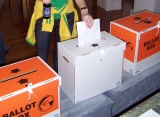 6 December 1905Special votes cast in general election
6 December 1905Special votes cast in general electionFor the first time in New Zealand’s electoral history, registered voters who were away from their electorate on polling day were able to cast a ‘special’ absentee vote at any polling booth in the country. Read more...
-
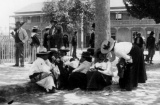 20 December 1893Women vote in Māori seats for first time
20 December 1893Women vote in Māori seats for first timeJust over three weeks after New Zealand women became the first in the world to vote in a national parliamentary election, voting was held in the four Māori electorates. Read more...
-
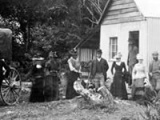 28 November 1893Women vote in first general election
28 November 1893Women vote in first general electionNew Zealand women went to the polls for the first time, just 10 weeks after the governor signed the Electoral Act 1893, making this country the first in in which women had the right to vote in parliamentary elections. Read more...
-
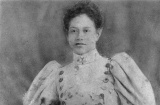 18 May 1893Meri Te Tai Mangakāhia addresses Kotahitanga Māori parliament
18 May 1893Meri Te Tai Mangakāhia addresses Kotahitanga Māori parliamentMeri Te Tai Mangakāhia, a prominent advocate for Māori women, addressed the Kotahitanga Māori parliament - the first woman known to have done so. Read more...
-
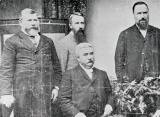 5 December 1890First 'one man one vote' election
5 December 1890First 'one man one vote' electionNew Zealand’s electoral law had been changed so that no one could vote in more than one general electoral district. This ended the long-standing practice of ‘plural voting’ by those who owned property in more than one electorate. Read more...
-
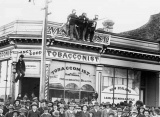 19 December 1879Universal male suffrage introduced
19 December 1879Universal male suffrage introducedThe Qualification of Electors Act extended the right to vote (the franchise) to all European men aged 21 or over, regardless of whether they owned or rented property. Read more...
-
 17 January 1853New Zealand Constitution Act comes into force
17 January 1853New Zealand Constitution Act comes into forceGovernor Sir George Grey issued a proclamation to bring the New Zealand Constitution Act (UK) 1852 into operation, establishing a system of representative government for the colony. Read more...
Articles
Women and the vote
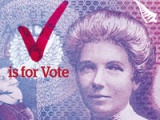
On 19 September 1893 the governor, Lord Glasgow, signed a new Electoral Act into law. As a result of this landmark legislation, New Zealand became the first self-governing country in the world in which all women had the right to vote in parliamentary elections.
-
Page 2 – Brief history
A history of the movement that won New Zealand women the vote in 1893
-
Page 3 – Women's suffrage milestones
Women's suffrage milestones from 1869 to 1999
-
Page 4 – The National Council of Women
Three years after the vote was won in 1893, a convention of representatives of 11 women's groups from throughout New Zealand resolved itself into the National Council of Women
-
Page 5 – World suffrage timeline
Although a number of other territories enfranchised women before 1893, New Zealand can justly claim to be the first self-governing country to grant the vote to all adult women
-
Page 6 – Women's suffrage petition
Search the women's suffrage petition.
-
Page 7 – About the suffrage petition
Information about the suffrage petition and searchable database
-
Page 8 – Further information
Find out more about women and the vote in New Zealand.
The road to MMP

In 1993 New Zealanders voted to replace their traditional first past the post (FPP) voting system with mixed member proportional representation (MMP). Eighteen years on, as Kiwis voted in a new electoral referendum, we explore how and why that dramatic reform came about.
-
Page 2 – First past the post
From 1853 until 1993 (apart from 1908–13) New Zealand elections were held under the first past the post (FPP) or plurality system.
-
Page 3 – The Royal Commission
During the 1981 and 1984 campaigns, Labour promised to set up a Royal Commission to look into a wide range of issues relating to the electoral system.
-
Page 4 – Putting it to the vote
Although only 55% of electors took part in a referendum, an overwhelming 85% voted to change their electoral system. In the second part of the poll, 70% favoured mixed member
-
Page 5 – 1996 and beyond - the road to MMP
The three years following the 1993 referendum, before the first MMP election in 1996, were ones of transition and uncertainty.
Election Days
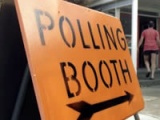
When New Zealanders go to the polls on 26 November 2011, they will continue a 158-year-old tradition of parliamentary democracy in this country. Politics may have changed beyond recognition since 1853, but the cut and thrust of the campaign trail, the power of advertising, and the drama of polling day remain as relevant as ever.
-
Page 2 – Early elections
Even though New Zealand's electoral franchise (right to vote) was more generous than Britain's, the colony's early elections were in many ways small-scale replicas of those in
-
Page 3 – Cleaning up elections
The New Zealand Parliament was alarmed by reports of electoral abuses in Auckland in the 1850s. It decided that electoral laws needed to be tightened, and in 1858 passed a
-
Page 4 – Nights on the town
After the colour and controversy of the 1850s, election days in New Zealand have generally been orderly affairs. Even so, election nights could still be lively occasions.
-
Page 5 – Peddling politicians
Given the printing technology of the time, early election posters and hoardings were inevitably simple.
-
Page 6 – Radio and TV
Electoral advertising was transformed first by radio, and later by television.
-
Page 7 – General Elections 1853–2020
Dates and turnout statistics for New Zealand general elections
-
Page 8 – Further information
Find out more about election days in New Zealand.
Temperance movement
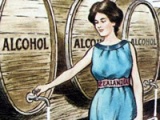
Temperance was one of the most divisive social issues in late-19th and early-20th century New Zealand. Social reformers who argued that alcohol fuelled poverty, ill health, crime and immorality nearly achieved national prohibition in a series of hotly contested referendums.
-
Page 3 – The no-license era
The 'three-fifths majority' was a major hurdle for the temperance community, but they soon mobilised to campaign for people to vote for it.
-
Page 4 – Voting for prohibition
The First World War period brought total or partial prohibition to several countries: New Zealand came within a whisker of joining them.
-
Page 5 – The decline of prohibition
Alcohol remained an important issue after the war, and the prohibitionists slogged it out with the liquor trade throughout the 1920s.
-
Page 6 – Masterton under no-license
The November 1908 licensing poll saw Masterton electorate introduce ‘no-license' and vote itself ‘dry’. Its 15 pubs closed on 1 July 1909, and remained closed
Should the voting age be lowered to 16?
Māori and the vote

Between April and June 1868 the first four Māori MPs were elected to New Zealand's Parliament. Despite ongoing debate, the Māori seats remain a distinctive feature of this country's electoral landscape almost 150 years later.
-
Page 3 – Change in the 20th century
The fall and rise of Māori seats in the 20th century.
-
Page 4 – Further information
Find out more about Māori and the vote in New Zealand.
The House of Representatives

New Zealand's Parliament dates back to 1854, just 14 years after the signing of the Treaty of Waitangi and the beginning of the European settlement of the country. For most of its history as a nation state, New Zealand has had some form of elected government.
- Page 4 - Doing businessThe operation of Parliament has changed over time as its workload has grown and new systems such as MMP have been implemented.
The 1920s

The 1920s was the decade that modern New Zealand came of age. Despite political and economic uncertainty, the country shrugged off the gloom of war to embrace the Jazz Age - an era of speed, power and glamour. Explore an overview of the decade and a year-by-year breakdown of key events.
- Page 10 - 1927 - key eventsA selection of key New Zealand events from
Biographies
-
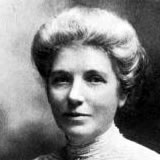 Sheppard, Katherine Wilson
Sheppard, Katherine Wilson
New Zealand was the first country in the world to grant women the vote. Kate Sheppard, leading light of the suffrage movement, was vindicated when 65% of New Zealand women took the chance to vote in their first general election.
Read more... -
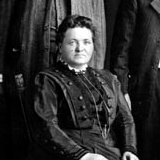 Morison, Harriet Russell
Morison, Harriet Russell
Dynamic and determined, Harriet Morison helped establish trade unions for female workers and was one of the leaders in the campaign to get votes for women.
Read more... -
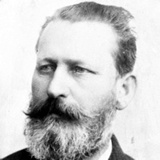 Fish, Henry Smith
Fish, Henry Smith
An able but controversial politician, Henry Smith Fish is best remembered for his aggressive attempts to prevent women getting the vote.
Read more...
Related keywords
- chatham islands
- elizabeth mccombs
- suffrage 125
- suffrage campaign
- MMP
- elections
- women in politics
- womens liberation
- harriet morison
- trade unions
- alcohol
- whanganui city
- christchurch
- parliament
- parliament buildings
- panorama
- masterton
- law
- meri mangakahia
- advertising
- reform party
- radio broadcasts
- television
- michael joseph savage
- robert muldoon
- henry fish
- MPs
- christianity
- prohibition
- temperance
- maori
- famous firsts
- liberal party
- americans
- business
- wellington city
- 1960s
- poster
- weslyans
- rotorua
- tahakopa
- legislative council
- george grey
- six oclock swill
- WW1
- Maori MPs
- land claims
- art
- daylight saving
- 1920s
- women
- kate sheppard
- stamps
- auckland city
- national council of women
- timeline
-
Main image: Florence Davis
Florence Davis is one of the many women who signed the 1892 women's suffrage petition, but not the better-known 1893 suffrage petition.




